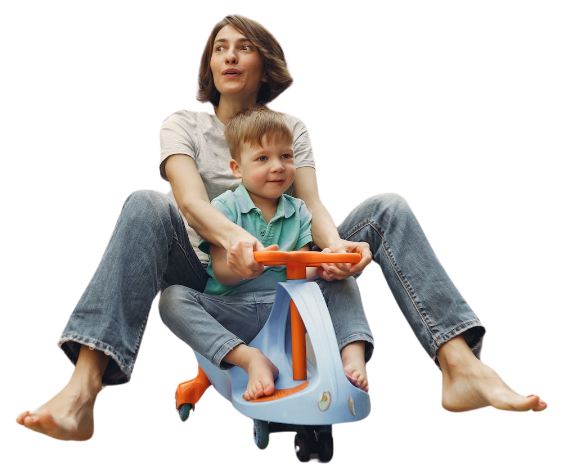
Raising a family can be quite expensive, with the average cost of raising a single child from birth to adulthood approaching nearly $25K for modern families.
Childcare is a huge contributor to that expense, consuming as much as 12-26% of a family’s income.
Parents often equate daycare to a second mortgage, and they’re not wrong. In fact, in many states, daycare costs more than a mortgage.
But is daycare really that expensive in your local area? Let’s break it down by state.
How much is daycare in my state?
This table shows the average cost of child care per child in each state. A word to the wise: an Au Pair costs the same no matter how many kids you have, making the Au Pair program a much more appealing offer for those with multiple kids.
| State | Avg Annual Cost Per Child | Single Parent Median Income | Percent of Single Parent Median Income | Married Couple Median Income | Percent of Married Couple Median Income | Region |
|---|---|---|---|---|---|---|
| Alabama | $7,280.00 | $22,307.00 | 32.60% | $87,714.00 | 8.30% | South |
| Alaska | $10,746.00 | $36,690.00 | 29.30% | $105,852.00 | 10.20% | Alaska |
| Arizona | $8,719.00 | $30,416.00 | 28.70% | $88,352.00 | 9.90% | SouthWest |
| Arkansas | $6,575.00 | $23,977.00 | 27.40% | $79,427.00 | 8.30% | South |
| California | $12,168.00 | $32,304.00 | 37.70% | $104,342.00 | 11.70% | West |
| Colorado | $11,911.00 | $35,019.00 | 34% | $106,653.00 | 11.20% | Mountain West |
| Connecticut | $13,052.00 | $33,515.00 | 38.90% | $131,995.00 | 9.90% | NorthEast |
| Delaware | $9,579.00 | $31,235.00 | 30.70% | $106,395.00 | 9% | NorthEast |
| District of Columbia | $19,214.00 | $30,695.00 | 62.60% | $197,375.00 | 9.70% | East |
| Florida | $7,186.00 | $29,625.00 | 24.30% | $86,244.00 | 8.30% | SouthEast |
| Georgia | $7,630.00 | $27,539.00 | 27.70% | $93,267.00 | 8.20% | South |
| Hawaii | $12,040.00 | $38,018.00 | 31.70% | $106,352.00 | 11.30% | Hawaii |
| Idaho | $8,317.00 | $25,771.00 | 32.30% | $80,962.00 | 10.30% | Mountain West |
| Illinois | $11,605.00 | $29,491.00 | 39.40% | $107,172.00 | 10.80% | MidWest |
| Indiana | $9,589.00 | $26,881.00 | 35.70% | $91,359.00 | 10.50% | MidWest |
| Iowa | $9,322.00 | $29,018.00 | 32.10% | $97,364.00 | 9.60% | MidWest |
| Kansas | $8,742.00 | $27,964.00 | 31.30% | $92,698.00 | 9.40% | MidWest |
| Kentucky | $6,841.00 | $23,104.00 | 29.60% | $86,059.00 | 7.90% | South |
| Louisiana | $7,800.00 | $21,764.00 | 35.80% | $95,486.00 | 8.20% | South |
| Maine | $9,891.00 | $30,138.00 | 32.80% | $94,782.00 | 10.40% | NorthEast |
| Maryland | $11,106.00 | $41,710.00 | 26.60% | $131,507.00 | 8.40% | East |
| Massachusetts | $16,781.00 | $32,621.00 | 51.40% | $139,726.00 | 12% | NorthEast |
| Michigan | $11,086.00 | $26,515.00 | 41.80% | $96,983.00 | 11.40% | MidWest |
| Minnesota | $12,954.00 | $33,474.00 | 38.70% | $114,765.00 | 11.30% | MidWest |
| Mississippi | $5,439.00 | $21,304.00 | 25.50% | $81,552.00 | 6.70% | South |
| Missouri | $7,062.00 | $27,055.00 | 26.10% | $92,711.00 | 7.60% | South |
| Montana | $9,334.00 | $25,865.00 | 36.10% | $89,296.00 | 10.50% | Mountain West |
| Nebraska | $11,440.00 | $29,170.00 | 39.20% | $96,217.00 | 11.90% | Mountain West |
| Nevada | $9,275.00 | $31,641.00 | 29.30% | $85,873.00 | 10.80% | West |
| New Hampshire | $11,114.00 | $34,976.00 | 31.80% | $119,313.00 | 9.30% | NorthEast |
| New Jersey | $13,367.00 | $33,541.00 | 39.90% | $133,609.00 | 10% | NorthEast |
| New Mexico | $8,766.00 | $24,293.00 | 36.10% | $78,803.00 | 11.10% | SouthWest |
| New York | $12,844.00 | $30,794.00 | 41.70% | $110,280.00 | 11.60% | NorthEast |
| North Carolina | $9,350.00 | $26,407.00 | 35.40% | $91,329.00 | 10.20% | East |
| North Dakota | $8,624.00 | $30,579.00 | 28.20% | $106,020.00 | 8.10% | Mountain West |
| Ohio | $8,303.00 | $25,487.00 | 32.60% | $98,574.00 | 8.40% | MidWest |
| Oklahoma | $7,520.00 | $25,178.00 | 29.90% | $82,503.00 | 9.10% | MidWest |
| Oregon | $8,749.00 | $29,124.00 | 30% | $96,745.00 | 9% | NorthWest |
| Pennsylvania | $10,150.00 | $29,017.00 | 35% | $105,032.00 | 9.70% | NorthEast |
| Rhode Island | $11,700.00 | $30,482.00 | 38.40% | $109,110.00 | 10.70% | NorthEast |
| South Carolina | $9,932.00 | $25,461.00 | 39% | $89,003.00 | 11.20% | South |
| South Dakota | $6,677.00 | $28,195.00 | 23.70% | $92,744.00 | 7.20% | Mountain West |
| Tennessee | $8,759.00 | $25,859.00 | 33.90% | $86,182.00 | 10.20% | South |
| Texas | $9,147.00 | $28,457.00 | 32.10% | $92,562.00 | 9.90% | South |
| Utah | $8,268.00 | $32,716.00 | 25.30% | $92,495.00 | 8.90% | Mountain West |
| Vermont | $12,835.00 | $30,866.00 | 41.60% | $99,985.00 | 12.80% | NorthEast |
| Virginia | $10,451.00 | $32,929.00 | 31.70% | $115,403.00 | 9.10% | East |
| Washington | $13,404.00 | $32,497.00 | 41.20% | $107,749.00 | 12.40% | NorthWest |
| West Virginia | $8,320.00 | $20,414.00 | 40.80% | $81,428.00 | 10.20% | South |
| Wisconsin | $10,536.00 | $29,956.00 | 35.20% | $101,951.00 | 10.30% | MidWest |
| Wyoming | $8,236.00 | $31,486.00 | 26.20% | $94,600.00 | 8.70% | Mountain West |
What is the average cost of daycare nationwide?
According to the Economic Policy Institute, the national average cost of childcare is $11,420. In some states, daycare can run as high as $20-24,000 per year.
Daycare costs have been rising in recent years. According to Care.com, the national average cost of daycare increased 15% overall between 2013-2018, with as much as a 8% increase in a single year.
In that same timeframe, the average cost of family care centers rose by 57%, and after school programs by 35%.
This is why many parents are turning to Au Pair childcare. The average cost of an Au Pair is less than daycare in many states.
How do home daycare prices compare?
According to Business Broker, center-based childcare is more expensive in every state. In some states, a daycare center is as much as 71% higher than a home-based daycare.

Care.com reports that the average family in-home daycare costs ~$200 per week in the U.S.
However, in-home daycare rates have risen as much as 10% per year since 2013, and they’re not slowing down. With the demand for childcare and the cost of living both rising rapidly, U.S. childcare providers are struggling to make a living.
Conversely, the average increase to the cost of hiring an Au Pair in the U.S. has stayed as low as 2%.
With the cost of daycare so high, what’s a parent to do?
It’s no wonder so many moms put their careers on hold due to the cost of childcare. The price tag of full-time daycare might have you wondering if it’s worth it to keep working, especially if you have more than one child in need of care.
But statistically, when moms drop out of the workforce, it can have a negative impact on future career advancements.
There’s good news though. Families all over the U.S. are turning to the Au Pair program for a live-in cultural childcare experience that goes far beyond basic care. Hiring an Au Pair means you get more than just someone who watches your child. Parents often report:
- Affordable rates compared to local childcare rates;
- More flexible scheduling due to a live-in arrangement;
- A meaningful friendship between the parents and Au Pair;
- Help with child-related chores, including the kids’ laundry;
- A deep, loving relationship between the Au Pair and children;
- Cultural and language immersion, widening the family’s world view;
- More time to focus on enriching the relationship between parent and child;
- Improved health and lifestyle due to having a third adult in the home to manage logistics.
“We are thrilled we chose an Au Pair service over daycare. The one-on-one care Ruby receives would not be possible in any other situation.”
– Mike, Host Dad
An Au… What?
 Au Pair childcare is unlike any other childcare arrangement in the world.
Au Pair childcare is unlike any other childcare arrangement in the world.
Au pair is a French term. Many sources online translate au pair as on par with, but the phrase actually goes much deeper than that.
Depending on context, the French word pair can translate to peer, colleague, even, or twin. Au is a preposition that can mean with, on, at, in, as of, belong with, in various contexts.
The term au pair implies that this person is your peer (they are adults, after all), your colleague in parenting. They’re on even footing with the parents; the children mind them and they have the parents’ respect. For all intents and purposes, they’re your twin in the context of parenting.
They are with you when you need them.
They belong with your family and household.
And more often than not, they will remain in your family’s hearts forever.
Some background on the Au Pair program…
The Au Pair program is a cultural exchange program overseen by the U.S. Department of State on the J-1 Visa. Through this program, international young adults can come to the U.S. and live with an American family for up to two years. The visa also requires Au Pairs to complete a minimum of 6 credit hours at an accredited university during their stay.
For the Au Pairs, it’s a great way to study abroad, become fluent in English, experience U.S. culture, and earn some pocket change while they’re here.
Though Au Pairs can watch your children for up to 45 hours per week (a max of 10 hours per day), they aren’t nannies. They don’t have a degree in childcare. And they don’t come here seeking work, but rather, an experience.
For Host Families, the motivation is often the same. Many parents are drawn to the affordability and flexibility of the program, but what they’re actually getting is far more than your average childcare.
How Much Does It Cost to Host an Au Pair?
The amount your Au Pair cost starts as low as $8.32 per hour, depending on the type of Au Pair you hire.
For a standard Au Pair providing up to 45 hours of childcare per week, families pay a minimum stipend of at least $195.75 per week to the Au Pair.
During the match process, Au Pairs and Host Families are free to negotiate a rate higher than the legally applicable minimum.
Other expenses Host Families are required to cover:
- Access to transportation;
- Private bedroom with a door;
- Tuition contribution ($500 for a standard Au Pair);
- Car insurance if your Au Pair will use the family car;
- Cell phone service (Au Pairs may provide their own cell phones);
- Fees for visa sponsorship and logistical services provided by the agency.

It starts with your free registration.
Sign up for free and start searching for your family’s newest member today.


